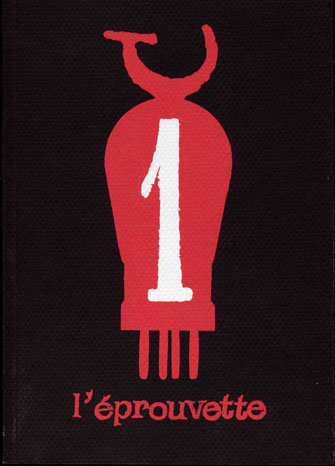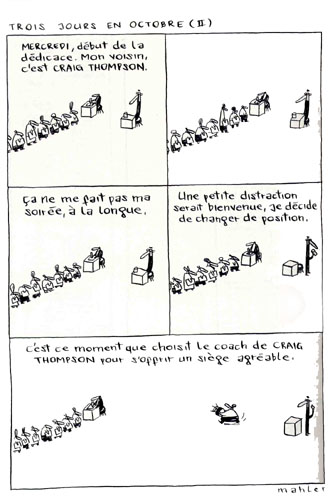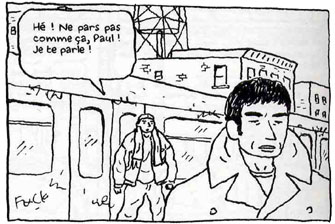 Home > Bart Beaty's Conversational Euro-Comics
Home > Bart Beaty's Conversational Euro-Comics L’Eprouvette, Various
posted July 27, 2006
L’Eprouvette, Various
posted July 27, 2006


With just two issues in print, it's time to anoint
L'Eprouvette (L'Association) the best comics magazine in the world. Taking the place of previous leaders in the field (
9e Art,
Comic Art,
The Comics Journal),
L'Eprouvette has raised the level of discourse about this art form to an entirely new level. Given that it is a) big, b) expensive, and c) French, I can't imagine that it will become a bestseller on this side of the Atlantic. So what can we take from the magazine to mimic its successes?
1. Size matters. Yes,
The Comics Journal has steadily upped its page count over the past several years, but it's still a dwarf in comparison to
L'Eprouvette whose first issue (January 2006) was 300 pages and whose second (June 2006) was more than 400.
TCJ may publish more total pages in a year, but the heft of
L'Eprouvette is far more compelling.
L'Eprouvette reads like a good book on comics, and that's a huge difference from
TCJ as a magazine. Interestingly,
Neuvieme Art, whose 12th issue is 262 pages, and
Comic Art, whose 8th is a step towards a larger format as well, have already taken this advice. Bigger please.
2. Shorter interviews are more interesting. I, for one, have lost interest in the all-encompassing and expansive interview that
TCJ made a staple of the form. Even when the subject is someone in whom I am genuinely interested, as with Matthias Wivel's recent interview with David B., I am hard-pressed to want to take on something with such enormity. More and shorter interviews seems infinitely preferable to me.
L'Eprouvette #2, for example, features a short interview of Julie Doucet where she talks about her decision to stop doing comics, accompanied by a number of examples of her recent non-comics work. The interview is brief, well-informed, well-illustrated and to the point. Longer is not better.

3. Integrate comics into the magazine. Often the best part of
L'Eprouvette is not the writing, but the comics. Each issue has featured dozens of new comic strips, gag cartoons, and even extended comics essays by well-known cartoonists. The second issue features a five-page comic about fanzines by Alex Baladi, short work by Nicolas Mahler about Angouleme, several pages by Riad Sattouf about the authors of fantasy comics. All of this is good, direct work that generally is difficult to place. Better: the issue also contains a number of commentaries by comics artists on comics done in the form of comics. Thus, Florent Ruppert and Jerome Mulot on Joann Sfar, and Matt Broersma positively demolishing Paul Pope over the course of seven-page "interview" with DC's sullen pretty boy ("You were good-looking... you had an "attitude!" The press loved you! You advanced towards the summit... Captain America and then Batman!"). Why are comics magazines so often so empty of comics?
4. Focus.
L'Eprouvette excels, as does 9e Art, at focused coverage of certain issues. True, they have chased some odd tangents. The first issue included more than 60 pages of debate on the subject of the "dedicace," or book-signing. Lewis Trondheim and Jean-Christophe Menu are against them, Killoffer likes them. Some of the best material came in the form of comics about book-signings, many of which were genuinely funny (Mahler being a stand-out here). Fabrice Neaud's essay on book signing was truly fascinating. The second issue fairs a little better, particularly with the dossier dedicated to the premature death of France's best children's comics anthology,
Capsule Cosmique. This 48-page dossier, created by the cartoonists affiliated with the magazine to visually recall the look and feel of the title killed by Milan, is an astounding glimpse inside the comics publishing industry. I've never read anything so good on the subject of the ins and outs of the industry.
5. Breadth. One thing that truly sets
L'Eprouvette apart is its wide-ranging sense of the art form. The second issue reprints several essays by former comics critic Barthelemy Schwartz alongside a new interview. They also run articles by distributors, publishers, artists, writers, and academics. There are more articles by practicing cartoonists here than in any other magazine, including long essays by Yvan Alagbe, Joann Sfar, David Vandermeulen, and short ones by Pakito Bolino. Menu offers a long essay on Charlotte Salomon. Forty pages are given over to the subject "Comics and the Avant-Garde." A dossier on plagiarism turns into "Swipe File" taken to the nth degree. Comics art exhibitions are not merely reviewed, but profiled, photographed, and recorded for posterity. Nothing seems beyond the scope of
L'Eprouvette, and it benefits enormously from this fact.

6. Write strongly and provoke reaction. L'Association, and particularly Menu and Trondheim, have rarely pulled punches, and
L'Eprouvette proves no exception. This is a magazine whose letters to the editor print the legal correspondence between L'Association and Casterman about the rights to David B.'s books. The second issue rips the lid off the recent "Trondheim Affair," in which many mainstream French comics critics became infuriated about the celebrated artist and comments that he made about journalists in a French magazine.
L'Eprouvette prints the private email correspondence from the members of ACBD (the Association of Comics Critics) revealing seething layers of resentment against the small press generally and Trondheim (who is compared to Goebbels!) specifically. To be fair,
The Comics Journal would likely still do this, too.
7. Form matters. Finally,
L'Eprouvette is, with the notable exception of
Comic Art, the best looking magazine about comics. The aforementioned dossier on
Capsule Cosmique, for example, is printed separately with in full color and on glossy paper, just like the magazine upon which it reports. The reproductions of Doucet's work are lovely. The whole package has a wonderful heft and feel, a lovely tactile value that I've never gotten from
The Comics Journal (nor, for that matter, from my computer screen when I read
ComicsReporter). These things still count. Perhaps now more than ever.
As I say, I don't think that L'Eprouvette will prove popular with non-French speakers as it is dense and wordy, and would be tough slogging for anyone not fully confident in the language. But if you're thinking of starting a new comics magazine, please consider stealing all their ideas. And if you publish one, please consider translating Broersma's piece on Paul Pope -- it's hilarious.
*****
To learn more about Dr. Bart Beaty, or to contact him,
try here.
Those interested in buying comics talked about in Bart Beaty's articles might try
here or
here.


